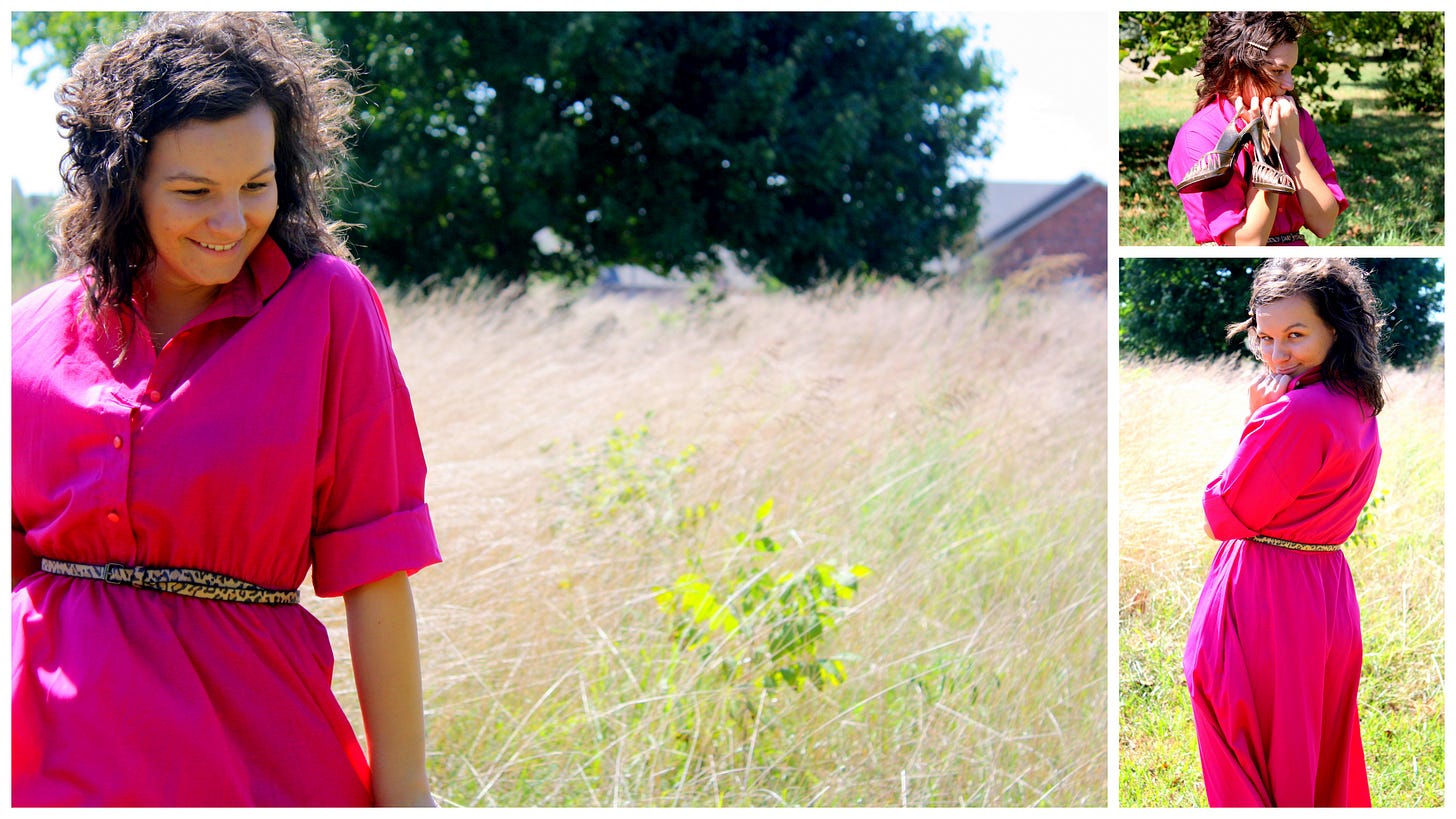Legalism made me fear being beautiful
How my beliefs on modesty have shifted over the last decade
After seeing photos from my law school graduation photos, a friend of my mom's (who has known me my entire life) told her that I looked pretty and she was glad I was finally taking are of my appearance.
That hurt, because did her comment imply I didn't take care of myself before?
Let's backtrack to gain some context:
I grew up in a Slavic immigrant community in the U.S., where our theology is heavily influenced by our culture and the "way things have always been done." The church I grew up in from the age of 15 until 22 was extremely conservative and legalistic, so I grew up hearing that women should dress modestly (i.e., wear long skirts, long sleeves, head coverings, no heels, hair up at all times, no makeup, etc).
Note, I'm not going to dive into purity culture here, although that plays it's own role in all the rules for a woman's appearance.
To fashion-loving me, those rules were really hard to abide by, but as a "good" girl and rule follower, I tried my best to please my parents and church, while also discovering my own interests (which in high school and college included fashion!).
When you're told over and over again that as a woman you shouldn't draw attention to your appearance - that you should cover up and stay quiet - it makes it really hard to put effort into your appearance.
I had a “rebellious” phase in high school and college when I leaned into my passion for fashion and would come up with unique outfits and even started a fashion blog. But even then, I still tried to stay within the rules of modesty I grew up around.

As I got older though, I started to dim my light and conform to what I was told a "good" Christian woman should be: unnoticeable.
I'd wear makeup, but just barely so it wouldn't be noticeable.
I'd spend an hour taming my curly frizzy hair, only to put it up five minutes after leaving the house because I felt so self-conscious.
I'd wear clothes and colors that didn't flatter me because I didn't want to draw attention to myself.
I was terrified to wear anything that would even remotely show my body shape.
I worried a Christian man wouldn’t marry me if I didn’t dress modestly.
I saw clothes as either "Christian" or "not Christian" based on how "modest" the item of clothing was.
Makeup, wearing your hair down, jewelry, pants for women — all "worldly" things to be avoided by a "good Christian girl".
I would judge other women based on the clothes they chose to wear, mostly because I was envious at their freedom to wear whatever made them feel pretty and confident. I would look at a well-dressed, beautiful, confident woman and wonder how she could do that.
Because spending time, effort and money on my enhancing my appearance - or caring about how I look - was a sin.
It seems silly to write that out now, but for years, this was what I heard in my head every time I tried to put any effort into my appearance.
I wanted to feel beautiful but I was scared that it would make me too "worldly."
Over the years, as I’ve studied the topic and prayed through this, my views on modesty have shifted.
I’ve learned that modesty is not only about how much your clothes cover your body or if they entice someone to lust, but more so about your heart and mind. It’s what occupies your mind, money and time.
In 1 Timothy 2:9-10, Apostle Paul instructs women to “dress modestly, with decency and propriety, adorning themselves not with elaborate hair styles or gold or pearls or expensive clothes, but with good deeds, appropriate for women who profess to worship God.”
The state of being immodest, as written in this passage, is excessive attention to outward appearance. It's a call to not imitate the world in its careful attention to outward appearance. Instead, he advises to shift our focus from outward appearance to godliness and good deeds.
As for outward appearance, it should be becoming, clean and appropriate. Which means that modestly looks different for each of us, because it depends on age, rank and means.
Modesty is dressing as appropriate and becoming for the occasion, your age, station / season in life and within your means / what you can afford. It’s viewing and valuing outward appearance in moderation.
The line is crossed into immodesty when we think more about our external appearance than the state of our heart and mind and doing the good work God has called us to do.
But even as my theology has shifted, it's been hard to completely stop hearing the messages I was taught about a woman's appearance, specifically how "dangerous" and "sinful" it can be. It makes a woman's beauty a weapon, a temptation, something to be wary of.
One of the first devotionals I wrote and published was on the Proverbs 7 woman. The Proverbs 7 is described as an immoral seductress, dressed like a harlot, who flatters with her words and uses her femininity to manipulate and destroy.
She is the epitome of what the conservative Evangelical circles try to warn young women not to become, because somehow "putting effort into your appearance to look your best externally" = "you're on the path to becoming a Proverbs 7 woman."
Or maybe it's just me. Maybe I took the conservative modesty teachings to heart and as a rule follower, they impacted me more extremely. Nonetheless, I am still unraveling this web in my 30's.
In recent years, some Evangelical authors and influencers are talking about the harms of purity culture and how they're opting out of those teachings that they themselves published books on and spoke about for years (Joshua Harris and the Girl Defined Ministries come to mind).
The intention behind these legalistic teachings on modesty and purity are well meaning and on the surface sound Biblically correct, but when you get to the heart of it, it's more about control than anything else. It's holding on tightly with religious rules and fear tactics to prevent an escape "into the world."
But I have seen that strategy fail more than it succeeds. Most kids I knew who grew up in homes and churches using that strategy no longer align with their parents' beliefs. They either left the church entirely or became lukewarm, world-like Christians.
Now, I'm not saying we should throw away all church and religious rules and do whatever we want. That's definitely not Biblical either.
But our salvation doesn't come from obeying rules, it comes through Jesus.
And where Jesus is, there is a heart change.
Yes, what is inward matters most, but the outside reflects what is on the inside. And if Joy and Love lives in my heart, shouldn't my appearance show that? Shouldn't that be attractive and desired? Not for the purpose of attracting attention to myself, but for pointing others to Him?
Mark 7:21-23 says that from the heart proceeds evil thoughts, fornication, thefts, murders, adultery, deeds of covetousness, wickedness, as well as deceit, sensuality, evil, slander, pride and foolishness. Galatians 5:19 says that sensuality is the deed of the flesh.
Paul Washer, although a conservative preacher, does have a good quote on this: "A woman can properly be called beautiful. A woman can properly be called elegant. But a woman who is sensual has an evil heart."
Because there is a difference between a beautiful, elegant woman, and a woman who intentionally dresses to attract the male gaze and make him want her sexually.
So, these are the differentiating factors:
What inner motivations or insecurities are driving my decisions when it comes to my outward appearance?
For what purpose do I seek to enhance my outward beauty?
Am I dressing as appropriate and becoming for the occasion, my age, station / season in life and within my means?
Note, the Bible does say not to put a stumbling block or hindrance before other Christians, which applies to all things, not just outward appearance. But it is also not a responsibility to be put exclusively on women to protect men from stumbling into lust based on a woman's appearance. Women are not a man's keeper. We each answer for our own behavior, thoughts and reactions.
One more thought —
A friend shared this article with me yesterday about why women are leaving the church and I’ve been pondering it ever since. Although the author focuses more on the topic of complementarian theology, I do think that legalism in the areas of modesty and purity also play a role for women who choose to leave the church.
I remember being a teenager and arguing with my dad yet again about why I couldn’t wear a certain piece of clothing and the sentiment I’d come back to is this:
I felt like my dad and my pastor back then cared more about how I looked than what was going on inside of me. I could be wrecked, struggling, anxious, lost, but as long as I dressed modestly and followed the rules, I was a “good” Christian.
Instead of asking how I was doing or encouraging me to grow spiritually, the majority of my interactions with my pastor back then included reprimands about my clothing or taking issue with my life choices (i.e., a woman going to college). I was a hurting, questioning teenager, but all anyone seemed to care about was what I wore.
I could have let that hurt make me leave the church and God. But instead, during my first year of law school, I decided to read through the entire Bible and ask God to teach me to believe for myself instead of just taking on the beliefs of what I was taught growing up.
In the end, on some topics, I ended up aligning with what my parents believed, but on other topics, like modesty, my beliefs shifted.
Anyhow, I feel like I am just now giving myself permission to figure out my own personal style without classifying items of clothing as "Christian" and not "Christian" and getting to a place where I don't feel guilty about caring about my appearance and trying to look my best (albeit hard to do postpartum after baby #2!).
For me, this looks like: investing in good quality skincare and makeup, focusing on my health, purging clothes that don't bring me joy and don't feel like who I am today, and trying to figure out my own personal style.
Until next time,







Thank you for sharing! I went through something similar and I appreciate you sharing your experiences
This was such a pleasure to read. I was saved last year but prior to this I definitely dressed quite seductively and was encouraged to do so by the peers and circles I was part of. It was a point of tension with my husband when we first met, and prior to being saved I didn’t get it. Since then I feel that I have found balance. I have always loved fashion and clothes, and you’re right it’s much more about your heart and mind and where you focus than just your external appearance. The real glow up is Christ 🕊️